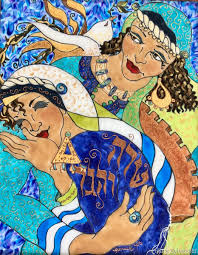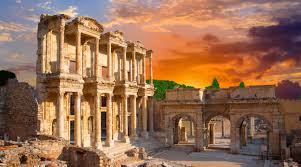Br – The Practical Argument: The Effects of Liberty 5:1 to 6:10
The Practical Argument:
The Effects of Liberty
5:1 to 6:10
In 1:11 to 2:21, Paul describes his personal argument, that he received an independent revelation through Yeshua Messiah. Paul declared that he was appointed an apostle by Yeshua before he met the other apostles; when he did meet them he was received as an equal. In 3:1 to 4:31 Paul defends his doctrine of justification by faith alone against the Judaizers (to see link click Ag – Who Were the Judaizers?) in his doctrinal argument.
Here, in 5:1 to 6:10 the inspired apostle presents his practical argument designed to correct the havoc which the teaching of the Judaizers was causing in the personal lives of the believers in Galatia. In 4:19 Paul expresses the wish that the Galatians would be molded into the image of Messiah; however, as it turned out, the Galatians had left their first love (see the commentary on Revelation Az – The Church at Ephesus), which before the coming of the Judaizers had been so obvious. This was the direct result of the Judaizer’s legalistic teachings. The Galatian believers, instead of depending upon the indwelling of the Ruach ha-Kodesh to mold them into the image of Messiah, were depending upon the flesh in an attempt to perfectly obey the 613 commandments of Moshe. Accordingly, Paul’s practical teaching emphasis the ministry of the Ruach, and the Galatians were encouraged to put themselves under His control.125
When we get to the fruit of the Ruach in 5:22 and 23, the first grouping of three, love, joy, and peace are God-ward, everything flows from that, and are all single syllable words; the second grouping of three, patience, kindness, and goodness are man-ward, how we treat each other, and are all two syllable words; and the third grouping of three, faithfulness, gentleness, and self-control are in-ward, it’s how we become what ADONAI wants us to be, and are all three syllable words.







 3. La ciudad:
3. La ciudad:  Inmediatamente después de la visión de Jesús en medio de
Inmediatamente después de la visión de Jesús en medio de  En consecuencia, la piedra que golpeó a la imagen vino a ser un gran monte que llenó toda la tierra (Daniel 2:35b). Siempre que el término, un gran monte se usa simbólicamente, es un símbolo de un rey, un reino o una corona. En este caso, el gran monte es el Reino de Dios, o el Reino mesiánico.
En consecuencia, la piedra que golpeó a la imagen vino a ser un gran monte que llenó toda la tierra (Daniel 2:35b). Siempre que el término, un gran monte se usa simbólicamente, es un símbolo de un rey, un reino o una corona. En este caso, el gran monte es el Reino de Dios, o el Reino mesiánico. Por lo tanto, en el año 364 dC, comenzó el equilibrio de poder este-oeste y continúa hasta nuestros días. Los centros del equilibrio de poder pueden cambiar nuevamente, pero seguirá siendo esencialmente un equilibrio este-oeste hasta que se dé paso a la tercera etapa. Y lo que viste de los pies y los dedos, en parte de barro cocido de alfarero y en parte de hierro, representan un reino dividido, pero habrá en él algo de la solidez del hierro, según viste el hierro mezclado con el barro cocido (Daniel 2:41). En consecuencia, en esta etapa de equilibrio de poder este-oeste, todavía había algo de la resistencia del hierro en ellos.
Por lo tanto, en el año 364 dC, comenzó el equilibrio de poder este-oeste y continúa hasta nuestros días. Los centros del equilibrio de poder pueden cambiar nuevamente, pero seguirá siendo esencialmente un equilibrio este-oeste hasta que se dé paso a la tercera etapa. Y lo que viste de los pies y los dedos, en parte de barro cocido de alfarero y en parte de hierro, representan un reino dividido, pero habrá en él algo de la solidez del hierro, según viste el hierro mezclado con el barro cocido (Daniel 2:41). En consecuencia, en esta etapa de equilibrio de poder este-oeste, todavía había algo de la resistencia del hierro en ellos.